A csomag telepítése után öt új modul kerül hozzáadásra a folyamatkezelés vezérlet feladat tevékenységeihez és szekvenciafolyam-műveleteihez.
Folyamatmodulok
Az új modulok megtekintéséhez:
-
Menjen az adminisztrátori felület Folyamatkezelés képernyőjére.
-
Hozzon létre egy új folyamatot vagy válasszon egy meglévő folyamatot, amely tartalmaz vezérelt feladat tevékenységet.
-
Kattintson a Tevékenységek elemre a bal oldalsávon lévő Elérhető folyamatelemek felületi elemben.
-
Hozzon létre egy új vezérelt feladat tevékenységet vagy szerkesszen egy meglévőt.
-
Válassza ki a Parancsfájl legördülő listában lévő új parancsfájlok egyikét.
-
ITSMConfigItemDataPull -
ITSMConfigItemDataPush -
LinkWithITSMConfigItem -
TicketLinkITSMConfigItem -
TicketUpdateByLinkedCI
-
-
Kattintson a Mentés gombra, ha a Beállítás gomb nem látható a Parancsfájl legördülő lista mellett.
-
Kattintson a Beállítás gombra a parancsfájl paramétereinek (kulcs-érték párok) hozzáadásához.
ITSMConfigItemDataPull
Egy modul egy kapcsolt ITSM konfigurációelemből történő adatlekéréshez.
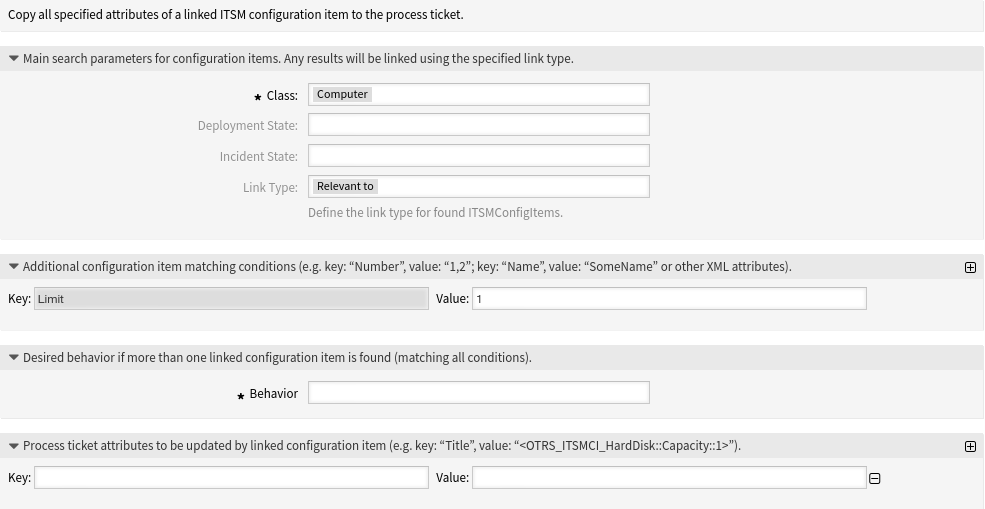
- Fő keresési paraméterek szakasz
-
A következő paraméterek használhatók a korlátozásokhoz:
-
Osztály *
-
Üzembe állítási állapot
-
Incidensállapot
-
Kapcsolat típusa
-
- További konfigurációelem-feltétel szakasz
-
Ez a szakasz konfigurációelemek keresésére használható.
A szűrők kulcs-érték párokkal adhatók hozzá. A szűrők között logikai ÉS kapcsolat van, ha egynél több szűrő kerül hozzáadásra. Logikai VAGY kapcsolat a
,karakterrel elválasztott több értékkel adható hozzá.A
Limitkulcs korlátozza a visszaadott konfigurációelemek számát. - Elvárt viselkedés szakasz
-
Ha egynél több konfigurációelem található a fenti szakaszban, akkor az elvárt viselkedés itt határozható meg.
Lehetséges értékek:
-
Attribútumok másolása az elsőként megtalált konfigurációelemből
-
Attribútumok másolása az utolsóként megtalált konfigurációelemből
-
A konfigurációelem figyelmen kívül hagyása, ne másoljon semmit sem
-
- Folyamatjegy attribútumai szakasz
-
Ezzel a modullal frissíthetők a folyamatjegy attribútumai. A kulcs a folyamatjegy attribútuma. Az érték lehet előre meghatározott szöveg, a kapcsolt konfigurációelemből származó attribútum OTRS címke formában, illetve a kettő kombinációja. Az
<OTRS_ITSMCI_*>OTRS címkeelőtag használható itt.Példák:
Kulcs
Érték
Priority5 very highDynamicField_Capacity<OTRS_ITSMCI_HardDisk::Capacity::1>TitleEbből: <OTRS_ITSMCI_Name>Lásd még
Nézze meg az ITSMConfigItemDataPull és a ConfigItemSearch() API-hivatkozást.
ITSMConfigItemDataPush
Egy modul a kapcsolt ITSM konfigurációelemekbe történő adatbeszúráshoz.
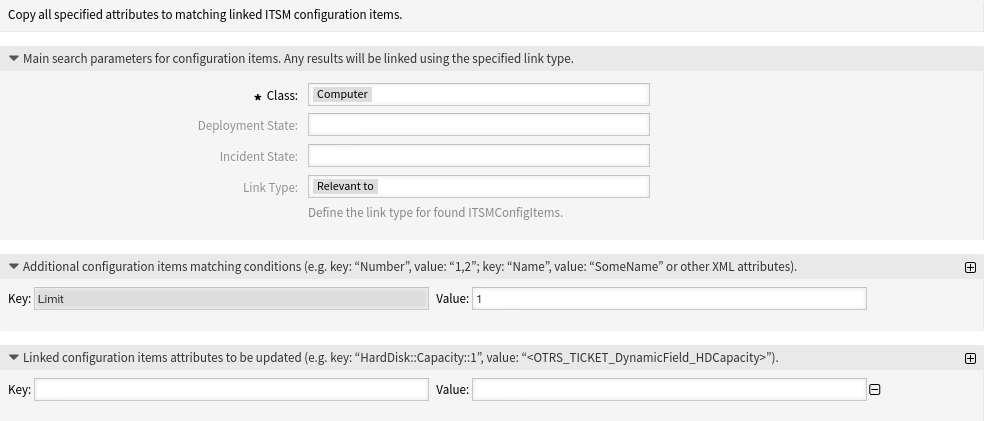
- Fő keresési paraméterek szakasz
-
A következő paraméterek használhatók a korlátozásokhoz:
-
Osztály *
-
Üzembe állítási állapot
-
Incidensállapot
-
Kapcsolat típusa
-
- További konfigurációelem-feltétel szakasz
-
Ez a szakasz konfigurációelemek keresésére használható.
A szűrők kulcs-érték párokkal adhatók hozzá. A szűrők között logikai ÉS kapcsolat van, ha egynél több szűrő kerül hozzáadásra. Logikai VAGY kapcsolat a
,karakterrel elválasztott több értékkel adható hozzá.A
Limitkulcs korlátozza a visszaadott konfigurációelemek számát. - Kapcsolt konfigurációelem attribútumai szakasz
-
Itt állíthatók be a frissítendő kapcsolt konfigurációelem attribútumai. A kulcs a kapcsolt konfigurációelem attribútuma. Az érték lehet előre meghatározott szöveg, a folyamatjegyből származó attribútum OTRS címke formában, illetve a kettő kombinációja. Az
<OTRS_TICKET_*>OTRS címkeelőtag használható itt.Példák:
Kulcs
Érték
ConfigItemCreateTimeNewerDate2021-10-20 12:23:34HardDisk::Capacity::1<OTRS_TICKET_DynamicField_HDCapacity>NameFolyamat: <OTRS_TICKET_DynamicField_ProcessManagementProcessID>Lásd még
Nézze meg az ITSMConfigItemDataPush és a ConfigItemSearch() API-hivatkozást.
LinkWithITSMConfigItem
Egy modul ITSM konfigurációelemek hozzákapcsolásához.
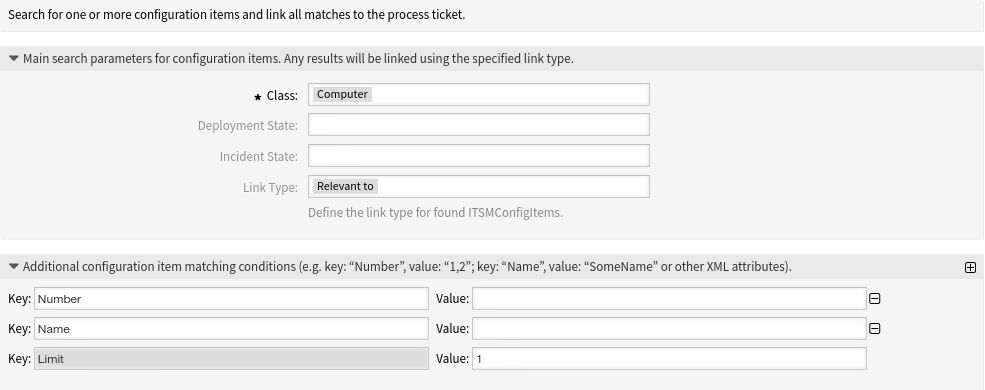
- Fő keresési paraméterek szakasz
-
A következő paraméterek használhatók a korlátozásokhoz:
-
Osztály *
-
Üzembe állítási állapot
-
Incidensállapot
-
Kapcsolat típusa
-
- További konfigurációelem-feltétel szakasz
-
Ez a szakasz konfigurációelemek keresésére használható.
A szűrők kulcs-érték párokkal adhatók hozzá. A szűrők között logikai ÉS kapcsolat van, ha egynél több szűrő kerül hozzáadásra. Logikai VAGY kapcsolat a
,karakterrel elválasztott több értékkel adható hozzá.A
Limitkulcs korlátozza a visszaadott konfigurációelemek számát.Lásd még
Nézze meg a LinkWithITSMConfigItem és a ConfigItemSearch() API-hivatkozást.
TicketLinkITSMConfigItem
Egy modul egy kiterjesztett konfigurációelem-keresés végrehajtásához és a keresési eredmény jegyhez történő hozzákapcsolásához.
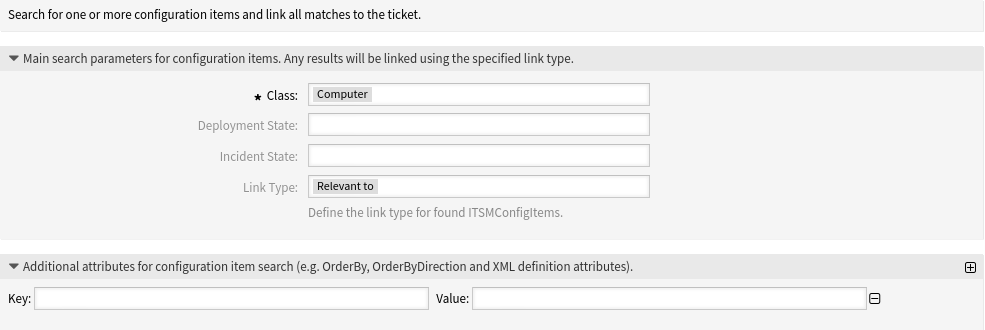
- Fő keresési paraméterek szakasz
-
A következő paraméterek használhatók a korlátozásokhoz:
-
Osztály *
-
Üzembe állítási állapot
-
Incidensállapot
-
Kapcsolat típusa
-
- További konfigurációelem-feltétel szakasz
-
Ez a szakasz konfigurációelemek keresésére használható.
A szűrők kulcs-érték párokkal adhatók hozzá. A szűrők között logikai ÉS kapcsolat van, ha egynél több szűrő kerül hozzáadásra. Logikai VAGY kapcsolat a
,karakterrel elválasztott több értékkel adható hozzá.Rendezheti a keresési eredményeket, ha megadja az
OrderBykulcsot és egy konfigurációelem attribútumát értékként.Az
OrderByDirectionkulccsal és azUpvagyDownértékekkel befolyásolhatja a rendezési sorrendet.Ha nincs rendezés megadva, akkor a rendezés automatikusan csökkenő sorrendben lesz végrehajtva a konfigurációelemek azonosítója alapján.
Lásd még
Nézze meg a TicketLinkITSMConfigItem és a ConfigItemSearch() API-hivatkozást.
TicketUpdateByLinkedCI
Egy modul a jegyattribútumoknak egy kapcsolt konfigurációelem alapján történő beállításához.
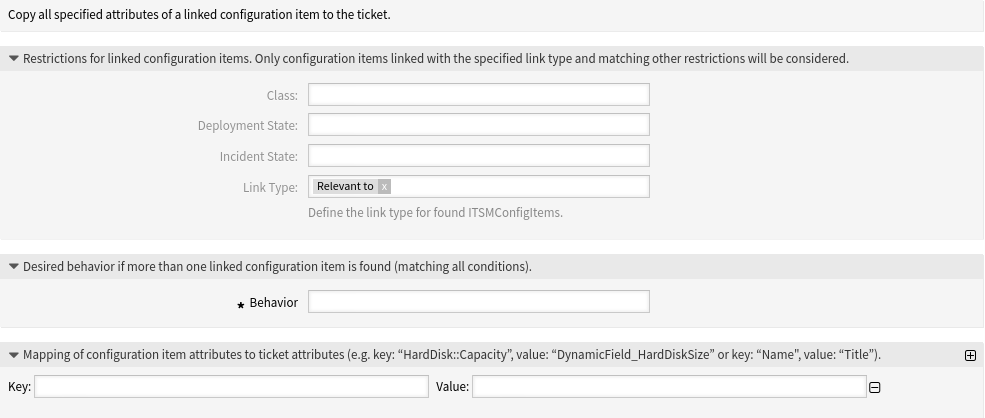
- Fő keresési paraméterek szakasz
-
A következő paraméterek használhatók a korlátozásokhoz:
-
Osztály
-
Üzembe állítási állapot
-
Incidensállapot
-
Kapcsolat típusa
-
- Elvárt viselkedés szakasz
-
Ha egynél több konfigurációelem található a fenti szakaszban, akkor az elvárt viselkedés itt határozható meg.
Lehetséges értékek:
-
Attribútumok másolása az elsőként megtalált konfigurációelemből
-
Attribútumok másolása az utolsóként megtalált konfigurációelemből
-
A konfigurációelem figyelmen kívül hagyása, ne másoljon semmit sem
-
- Konfigurációelem jegybe történő leképezése szakasz
-
Ezzel a modullal a konfigurációelem attribútumai jegyattribútumokra képezhetők le. A kulcs a konfigurációelem attribútuma. Az érték a jegy attribútuma.
Példák:
Kulcs
Érték
HardDisk::CapacityDynamicField_HDCapacityNameTitleLásd még
Nézze meg a TicketUpdateByLinkedCI és a ConfigItemSearch() API-hivatkozást.
API-hivatkozás
Ezek az API-hivatkozások nem érhetők el az interneten, de ez a leírás tartalmazza azokat.
ITSMConfigItemDataPull API
NAME
Kernel::System::ProcessManagement::Modules::ITSMConfigItemDataPull - A module to fetch data from a linked ITSM configuration item.
DESCRIPTION
All ITSMConfigItemDataPull functions.
PUBLIC INTERFACE
new()
Don't use the constructor directly, use the ObjectManager instead:
my $ITSMConfigItemDataPullObject = $Kernel::OM->Get('Kernel::System::ProcessManagement::Modules::ITSMConfigItemDataPull');
Run()
Run Data
my $Success = $ITSMConfigItemDataPullObject->Run(
UserID => 123,
Ticket => \%Ticket, # required
ProcessEntityID => 'P123',
ActivityEntityID => 'A123',
SequenceFlowEntityID => 'T123',
SequenceFlowActionEntityID => 'TA123',
Config => {
ConfigITSMConfigItemSearch => {
ClassIDs => [9, 8, 7, 6], # (optional)
DeplStateIDs => [1, 2, 3, 4], # (optional)
InciStateIDs => [1, 2, 3, 4], # (optional)
LinkType => 'RelevantTo::Source', # (optional)
},
ConfigSearchKeyValueList => {
Name => 'The Name', # (optional)
# configuration items with created time after ...
ConfigItemCreateTimeNewerDate => '2006-01-09 00:00:01', # (optional)
# configuration items with created time before then ....
ConfigItemCreateTimeOlderDate => '2006-01-19 23:59:59', # (optional)
# configuration items with changed time after ...
ConfigItemChangeTimeNewerDate => '2006-01-09 00:00:01', # (optional)
# configuration items with changed time before then ....
ConfigItemChangeTimeOlderDate => '2006-01-19 23:59:59', # (optional)
# XML attributes (defined by class)
'ElementA::ElementB' => '%contentA%',
'ElementA::ElementB' => '%contentC%,%contentD%,%contentE%,
}.
UserID => 123, # optional,to override the UserID from the logged user
ConfigDropdown => {
Behavior => 'NoCopy', # 'NoCopy', 'CopyFirstLinked' or 'CopyLastLinked' only
},
UserID => 123, # optional,to override the UserID from the logged user
# Value set:
# * Key is the attribute of the linked ITSM configuration item where the data will be set,
# * Value is the value is the value to be set, supporting smart tags <OTRS_ITSMCI_*> from the resulting linked
# configuration item after match and behavior filters
#
# Example:
# * To set process ticket title to be exactly the linked configuration item first element of field someDefinitionField::Sub
# Title => '<OTRS_ITSMCI_someDefinitionField::Sub::1>',
# where 'Sub' is a sub field of field 'someDefinitionField'
# * To set process ticket title to be exactly the linked configuration item second element of field someDefinitionField
# Title => '<OTRS_ITSMCI_someDefinitionField2::2>',
# * To set the process ticket dynamic field NameX to an static value (not real pull):
# DynamicField_NameX => 'someValue',
}
);
- `Ticket` contains the result of TicketGet including DynamicFields.
ITSMConfigItemDataPush API
NAME
Kernel::System::ProcessManagement::Modules::ITSMConfigItemDataPush - A module to insert data to a linked ITSM configuration items.
DESCRIPTION
All ITSMConfigItemDataPush functions.
PUBLIC INTERFACE
new()
Don't use the constructor directly, use the ObjectManager instead:
my $ITSMConfigItemDataPushObject = $Kernel::OM->Get('Kernel::System::ProcessManagement::Modules::ITSMConfigItemDataPush');
Run()
Run Data
my $Success = $ITSMConfigItemDataPullObject->Run(
UserID => 123,
Ticket => \%Ticket, # required
ProcessEntityID => 'P123',
ActivityEntityID => 'A123',
SequenceFlowEntityID => 'T123',
SequenceFlowActionEntityID => 'TA123',
Config => {
ConfigITSMConfigItemSearch => {
ClassIDs => [9, 8, 7, 6], # (optional)
DeplStateIDs => [1, 2, 3, 4], # (optional)
InciStateIDs => [1, 2, 3, 4], # (optional)
LinkType => 'RelevantTo::Source', # (optional)
},
ConfigSearchKeyValueList => {
Name => 'The Name', # (optional)
# configuration items with created time after ...
ConfigItemCreateTimeNewerDate => '2006-01-09 00:00:01', # (optional)
# configuration items with created time before then ....
ConfigItemCreateTimeOlderDate => '2006-01-19 23:59:59', # (optional)
# configuration items with changed time after ...
ConfigItemChangeTimeNewerDate => '2006-01-09 00:00:01', # (optional)
# configuration items with changed time before then ....
ConfigItemChangeTimeOlderDate => '2006-01-19 23:59:59', # (optional)
# XML attributes (defined by class)
'ElementA::ElementB' => '%contentA%',
'ElementA::ElementB' => '%contentC%,%contentD%,%contentE%,
}.
UserID => 123, # optional,to override the UserID from the logged user
ConfigDropdown => {
Behavior => 'NoCopy', # 'NoCopy', 'CopyFirstLinked' or 'CopyLastLinked' only
},
UserID => 123, # optional,to override the UserID from the logged user
# Value set:
# * Key is the attribute of the linked ITSM configuration items where the data will be pushed,
# * Value is the value is the value to be set, supporting smart tags <OTRS_TICKET_*> from the current process ticket e.g.
#
# Example:
# * To set linked ITSM configuration items first element of someDefinitionField::Sub to be exactly the process ticket QueueID:
# 'someDefinitionField::Sub::1' => '<OTRS_Ticket_QueueID>',
# Where 'Sub' is a sub field of 'someDefinitionField' field
# * To set linked ITSM configuration items second element of someDefinitionField2 to be the concatenation of
# some text and the content of the process ticket dynamic field ExternalField2:
# 'someDefinitionField2::2' => 'Some text <OTRS_Ticket_DynamicField_ExternalField2>',
# * To set linked ITSM configuration items last element of someDefinitionField::Sub to be an static text:
# 'someDefinitionField::Sub' => 'Some text',
}
);
- `Ticket` contains the result of TicketGet including DynamicFields.
LinkWithITSMConfigItem API
NAME
Kernel::System::ProcessManagement::Modules::LinkWithITSMConfigItem - A module to link ITSM configuration items.
DESCRIPTION
All LinkWithITSMConfigItem functions.
PUBLIC INTERFACE
new()
Don't use the constructor directly, use the ObjectManager instead:
my $LinkWithITSMConfigItemObject = $Kernel::OM->Get('Kernel::System::ProcessManagement::Modules::LinkWithITSMConfigItem');
Run()
Run Data
my $Success = $LinkWithITSMConfigItem->Run(
UserID => 123,
Ticket => \%Ticket, # required
ProcessEntityID => 'P123',
ActivityEntityID => 'A123',
SequenceFlowEntityID => 'T123',
SequenceFlowActionEntityID => 'TA123',
Config => {
ConfigITSMConfigItemSearch => {
ClassIDs => [9, 8, 7, 6], # (optional)
DeplStateIDs => [1, 2, 3, 4], # (optional)
InciStateIDs => [1, 2, 3, 4], # (optional)
LinkType => 'RelevantTo::Source', # (optional)
},
ConfigSearchKeyValueList => {
Number => 'The ConfigItem Number', # (optional)
Name => 'The Name', # (optional)
# configuration items with created time after ...
ConfigItemCreateTimeNewerDate => '2006-01-09 00:00:01', # (optional)
# configuration items with created time before then ....
ConfigItemCreateTimeOlderDate => '2006-01-19 23:59:59', # (optional)
# configuration items with changed time after ...
ConfigItemChangeTimeNewerDate => '2006-01-09 00:00:01', # (optional)
# configuration items with changed time before then ....
ConfigItemChangeTimeOlderDate => '2006-01-19 23:59:59', # (optional)
# XML attributes (defined by class)
'ElementA::ElementB' => '%contentA%',
'ElementA::ElementB' => '%contentC%,%contentD%,%contentE%,
}.
UserID => 123, # optional,to override the UserID from the logged user
}
);
- `Ticket` contains the result of TicketGet including DynamicFields.
TicketLinkITSMConfigItem API
NAME
Kernel::System::ProcessManagement::Modules::TicketLinkITSMConfigItem - A module to perform an extended configuration item search and link search results to ticket.
DESCRIPTION
All TicketLinkITSMConfigItem functions.
PUBLIC INTERFACE
new()
Don't use the constructor directly, use the ObjectManager instead:
my $TicketLinkITSMConfigItemObject = $Kernel::OM->Get('Kernel::System::ProcessManagement::Modules::TicketLinkITSMConfigItem');
Run()
Run Data
my $Success = $TicketLinkITSMConfigItemObject->Run(
UserID => 123,
Ticket => \%Ticket, # required
ProcessEntityID => 'P123',
ActivityEntityID => 'A123',
SequenceFlowEntityID => 'T123',
SequenceFlowActionEntityID => 'TA123',
Config => {
UserID => 123, # optional, to override the UserID from the logged user
}
);
- `Ticket` contains the result of TicketGet including DynamicFields.
- `Config` is the Config Hash stored in a Process::SequenceFlowAction's Config key.
TicketUpdateByLinkedCI API
NAME
Kernel::System::ProcessManagement::Modules::TicketUpdateByLinkedCI - A module to set ticket attributes based on a linked configuration item.
DESCRIPTION
All TicketUpdateByLinkedCI functions.
PUBLIC INTERFACE
new()
Don't use the constructor directly, use the ObjectManager instead:
my $TicketUpdateByLinkedCIObject = $Kernel::OM->Get('Kernel::System::ProcessManagement::Modules::TicketUpdateByLinkedCI');
Run()
Run Data
my $Success = $TicketUpdateByLinkedCIObject->Run(
UserID => 123,
Ticket => \%Ticket, # required
ProcessEntityID => 'P123',
ActivityEntityID => 'A123',
SequenceFlowEntityID => 'T123',
SequenceFlowActionEntityID => 'TA123',
Config => {
ConfigITSMConfigItemSearch => {
ClassID => 123, # optional
DeplStateIDs => [123], # optional
InciStateIDs => [123], # optional
LinkType => 'someType::someDirection', # optional
},
ConfigDropdown => {
Behavior => 'NoCopy', # 'CopyFirstLinked', 'CopyLastLinked'
},
'someDefinitionField::Sub' => 'DynamicField_someName', # example optional
'someDefinitionField2' => 'someTicketAttribute', # example optional
UserID => 123, # optional, to override the UserID from the logged user
}
);
- `Ticket` contains the result of TicketGet including DynamicFields.
- `Config` is the Config Hash stored in a Process::SequenceFlowAction's Config key.
ConfigItemCreate() API
perform ConfigItemCreate Operation. This will return the created config item number.
my $Result = $OperationObject->Run(
Data => {
UserLogin => 'some agent login', # UserLogin or AccessToken is required
AccessToken => 'eyJhbGciOiJIUzI1NiJ9[...],'
Password => 'some password', # if UserLogin is sent then
# Password is required
ConfigItem => {
Number => '111', # optional
Class => 'Configuration Item Class',
Name => 'The Name',
DeplState => 'deployment state',
InciState => 'incident state',
CIXMLData => $ArrayHashRef, # it depends on the Configuration Item class and definition
Attachment => [
{
Content => 'content' # base64 encoded
ContentType => 'some content type'
Filename => 'some fine name'
},
# ...
],
#or
#Attachment => {
# Content => 'content'
# ContentType => 'some content type'
# Filename => 'some fine name'
#},
},
},
);
$Result = {
Success => 1, # 0 or 1
ErrorMessage => '', # in case of error
Data => { # result data payload after Operation
ConfigItemID => 123, # Configuration Item ID number in OTRS::ITSM (Service desk system)
Number => 2324454323322 # Configuration Item Number in OTRS::ITSM (Service desk system)
Error => { # should not return errors
ErrorCode => 'ConfigItemCreate.ErrorCode'
ErrorMessage => 'Error Description'
},
},
};
ConfigItemDelete() API
perform ConfigItemDelete Operation. This function is able to return
one or more ConfigItem entries in one call.
my $Result = $OperationObject->Run(
Data => {
UserLogin => 'some agent login', # UserLogin or CustomerUserLogin or AccessToken is
# required
CustomerUserLogin => 'some customer login',
AccessToken => 'eyJhbGciOiJIUzI1NiJ9[...]',
Password => 'some password', # if UserLogin or customerUserLogin is sent then
# Password is required
ConfigItemID => '32,33', # required, could be coma separated IDs or an Array
},
);
$Result = {
Success => 1, # 0 or 1
ErrorMessage => '', # in case of error
Data => { # result data payload after Operation
ConfigItemID => [123, 456], # Configuration Item IDs number in OTRS::ITSM (Service desk system)
Error => { # should not return errors
ErrorCode => 'ConfigItemDelete.ErrorCode'
ErrorMessage => 'Error Description'
},
},
};
ConfigItemGet() API
perform ConfigItemGet Operation. This function is able to return
one or more ConfigItem entries in one call.
my $Result = $OperationObject->Run(
Data => {
UserLogin => 'some agent login', # UserLogin or AccessToken is
AccessToken => 'eyJhbGciOiJIUzI1NiJ9[...]', # required
Password => 'some password', # if UserLogin is sent then Password is required
ConfigItemID => '32,33', # required, could be coma separated IDs or an Array
Attachments => 1, # Optional, 1 as default. If it's set with the value 1,
# attachments for articles will be included on ConfigItem data
},
);
$Result = {
Success => 1, # 0 or 1
ErrorMessage => '', # In case of an error
Data => {
ConfigItem => [
{
Number => '20101027000001',
ConfigItemID => 123,
Name => 'some name',
Class => 'some class',
VersionID => 123,
LastVersionID => 123,
DefinitionID => 123,
InciState => 'some incident state',
InciStateType => 'some incident state type',
DeplState => 'some deployment state',
DeplStateType => 'some deployment state type',
CurInciState => 'some incident state',
CurInciStateType => 'some incident state type',
CurDeplState => 'some deployment state',
CurDeplStateType => 'some deployment state type',
CreateTime => '2010-10-27 20:15:00'
CreateBy => 123,
CIXMLData => $XMLDataHashRef,
Attachment => [
{
Content => "xxxx", # actual attachment contents, base64 enconded
ContentType => "application/pdf",
Filename => "StdAttachment-Test1.pdf",
Filesize => "4.6 KBytes",
Preferences => $PreferencesHashRef,
},
{
# . . .
},
],
},
{
# . . .
},
],
},
};
ConfigItemSearch() API
ConfigItemSearch()
return a configuration item list as an array reference
my $ConfigItemIDs = $ConfigItemObject->ConfigItemSearch(
Number => 'The ConfigItem Number', # (optional)
ClassIDs => [9, 8, 7, 6], # (optional)
DeplStateIDs => [1, 2, 3, 4], # (optional)
InciStateIDs => [1, 2, 3, 4], # (optional)
CreateBy => [1, 2, 3], # (optional)
ChangeBy => [3, 2, 1], # (optional)
# configuration items with created time after ...
ConfigItemCreateTimeNewerDate => '2006-01-09 00:00:01', # (optional)
# configuration items with created time before then ....
ConfigItemCreateTimeOlderDate => '2006-01-19 23:59:59', # (optional)
# configuration items with changed time after ...
ConfigItemChangeTimeNewerDate => '2006-01-09 00:00:01', # (optional)
# configuration items with changed time before then ....
ConfigItemChangeTimeOlderDate => '2006-01-19 23:59:59', # (optional)
OrderBy => [ 'ConfigItemID', 'Number' ], # (optional)
# default: [ 'ConfigItemID' ]
# (ConfigItemID, Number, ClassID, DeplStateID, InciStateID,
# CreateTime, CreateBy, ChangeTime, ChangeBy)
# Additional information for OrderBy:
# The OrderByDirection can be specified for each OrderBy attribute.
# The pairing is made by the array indices.
OrderByDirection => [ 'Down', 'Up' ], # (optional)
# default: [ 'Down' ]
# (Down | Up)
Limit => 122, # (optional)
UsingWildcards => 0, # (optional) default 1
);
ConfigItemSearchExtended()
return a configuration item list as an array reference
my $ConfigItemIDs = $ConfigItemObject->ConfigItemSearchExtended(
Number => 'The ConfigItem Number', # (optional)
Name => 'The Name', # (optional)
ClassIDs => [9, 8, 7, 6], # (optional)
DeplStateIDs => [1, 2, 3, 4], # (optional)
InciStateIDs => [1, 2, 3, 4], # (optional)
# configuration items with created time after ...
ConfigItemCreateTimeNewerDate => '2006-01-09 00:00:01', # (optional)
# configuration items with created time before then ....
ConfigItemCreateTimeOlderDate => '2006-01-19 23:59:59', # (optional)
# configuration items with changed time after ...
ConfigItemChangeTimeNewerDate => '2006-01-09 00:00:01', # (optional)
# configuration items with changed time before then ....
ConfigItemChangeTimeOlderDate => '2006-01-19 23:59:59', # (optional)
What => [ # (optional)
# each array element is a and condition
{
# or condition in hash
"[%]{'ElementA'}[%]{'ElementB'}[%]{'Content'}" => '%contentA%',
"[%]{'ElementA'}[%]{'ElementC'}[%]{'Content'}" => '%contentA%',
},
{
"[%]{'ElementA'}[%]{'ElementB'}[%]{'Content'}" => '%contentB%',
"[%]{'ElementA'}[%]{'ElementC'}[%]{'Content'}" => '%contentB%',
},
{
# use array reference if different content with same key was searched
"[%]{'ElementA'}[%]{'ElementB'}[%]{'Content'}" => ['%contentC%', '%contentD%', '%contentE%'],
"[%]{'ElementA'}[%]{'ElementC'}[%]{'Content'}" => ['%contentC%', '%contentD%', '%contentE%'],
},
],
PreviousVersionSearch => 1, # (optional) default 0 (0|1)
OrderBy => [ 'ConfigItemID', 'Number' ], # (optional)
# default: [ 'ConfigItemID' ]
# (ConfigItemID, Number, Name, ClassID, DeplStateID, InciStateID,
# CreateTime, CreateBy, ChangeTime, ChangeBy)
# Additional information for OrderBy:
# The OrderByDirection can be specified for each OrderBy attribute.
# The pairing is made by the array indices.
OrderByDirection => [ 'Down', 'Up' ], # (optional)
# default: [ 'Down' ]
# (Down | Up)
Limit => 122, # (optional)
UsingWildcards => 0, # (optional) default 1
);
ConfigItemUpdate() API
perform ConfigItemUpdate Operation. This will return the updated configuration item number.
my $Result = $OperationObject->Run(
Data => {
UserLogin => 'some agent login', # UserLogin or AccessToken is
AccessToken => 123, # required
Password => 'some password', # if UserLogin is sent then Password is required
ReplaceExistingData => 0, # optional, 0 or 1, default 0
# this will replace the existing XML data and attachments
ConfigItemID => 123,
ConfigItem => {
Class => 'Configuration Item Class',
Name => 'The Name',
DeplState => 'deployment state',
InciState => 'incident state',
CIXMLData => $ArrayHashRef, # it depends on the Configuration Item class and definition
Attachment => [
{
Content => 'content' # base64 encoded
ContentType => 'some content type'
Filename => 'some fine name'
},
# ...
],
# or
#Attachment => {
# Content => 'content'
# ContentType => 'some content type'
# Filename => 'some fine name'
#},
},
},
);
$Result = {
Success => 1, # 0 or 1
ErrorMessage => '', # in case of error
Data => { # result data payload after Operation
ConfigItemID => 123, # Configuration Item ID number in OTRS::ITSM (Service desk system)
Number => 2324454323322 # Configuration Item Number in OTRS::ITSM (Service desk system)
Error => { # should not return errors
ErrorCode => 'ConfigItemUpdate.ErrorCode'
ErrorMessage => 'Error Description'
},
},
};

